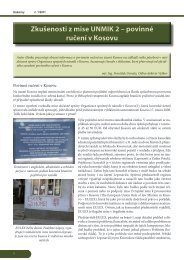TRADOC Pam 525-3-7-01 - TRADOC - U.S. Army
TRADOC Pam 525-3-7-01 - TRADOC - U.S. Army
TRADOC Pam 525-3-7-01 - TRADOC - U.S. Army
- No tags were found...
Create successful ePaper yourself
Turn your PDF publications into a flip-book with our unique Google optimized e-Paper software.
<strong>TRADOC</strong> <strong>Pam</strong> <strong>525</strong>-3-7-<strong>01</strong>Americans normally recoil at employing draconian violence to impose our will on adisaffected people. American forces will require at least the toleration if not the full support ofthe local population to defeat hostile insurgent forces. Negotiation, as well as coercion andcommand, are essential skills for the types of conflict that will continue to dominate the future.To win the cooperation, compliance, and support of a foreign people as well as that of theAmerican people, American Soldiers must understand the culture and their actual, oftenunintended, effects on the local population. However, the <strong>Army</strong> may only be able to providerudimentary cultural orientations to deploying units. This places the burden on senior leaders andspecialists, such as foreign area officers, to guide and direct cultural interaction.Thus, an essential element of the human dimension will be a developed understanding andrespect for the importance of culture, something anthropologist Clifford Geertz has referred to as“webs of meaning they [all societies] themselves have spun.” 88 Culture is the collective sum ofthe subjective worldview everyone forms around him or herself. Shared worldviews, andparticularly common values and expectations, separate groups and thereby define communities. 89Developing such an understanding will require an increased emphasis on language training andproficiency, the acquisition of which increases socio-cultural awareness.As important as the physical terrain, infuture full spectrum operations, commandersrequire the capability to understand andaddress the “human terrain,” of social,cultural, historical, political, economic, andpopulation and urban geography of the area ofoperations (AO). Culture is common beliefs,values, and attitudes, which together definecollective and individual identity. Culturedetermines meaning assigned to particularevents. It helps define, what behaviors areacceptable, and unacceptable as wellbehaviors to avoid.Cultural awareness will not necessarily alwaysenable us to predict what the enemy andnoncombatants will do, but it will help us betterunderstand what motivates them, what isimportant to the host nation in which we serve,and how we can either elicit the support of thepopulation or at least diminish their supportand aid to the enemy.Major General Benjamin C. Freakley CommandingGeneral, CJTF-76 Afghanistan, 2006The <strong>Army</strong> conducts operations in a joint, multinational, and interagency environment today.<strong>Army</strong> leaders increasingly confront the need to negotiate and coordinate operations with otherinterested parties. These negotiations are complex, multi-party, multi-issue, cross-cultural,repetitive, and frequently relationship-based. The stakes are enormous. FM 3-24 and MarineCorps Warfighting Publication 3-33.5, lists six institutional groups whose integratedcollaboration is essential for successful COIN but could apply equally to other operations. Theyinclude U.S. government agencies other than DOD; other nation’s defense and non-defenseagencies and ministries; international government organizations, such as the UN and itssubordinate organizations; nongovernmental organizations; private corporations, includingcontractors; and, other organizations that wield diplomatic, informational, and economic power.Each represents unique cultures, all of which the <strong>Army</strong> must understand, and, to some extentaccommodate, to achieve effective collaboration. This characteristic of current operations willonly expand and gain more importance as America remains engaged in persistent conflict.72



